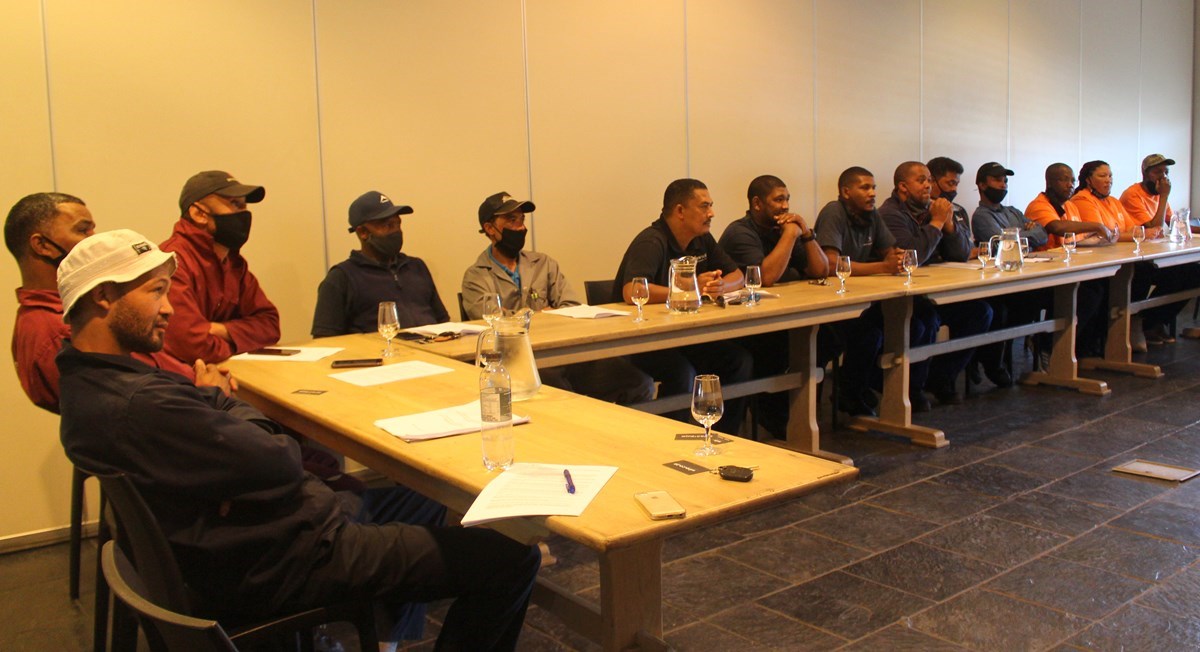Senior Cellar Assistants from across the wine regions regularly attend Winetech's informative and educational sessions - see more HERE.
The most recent quarterly workshop, held exclusively for Senior Cellar Assistants, was held at Neethlingshof in Stellenbosch on Wed 11 November which I attended. Their sessions are very insightful and having De Wet Viljoen taking everyone through the steps of what makes up the costs of producing wine was a great privilege. He has been at the farm for 17 years, and so alongside all the senior cellar assistants and their years of working in the winelands, the room held well over 300 years worth of experience. With many of the attendees having been at their wine farms for 15, 20 and 25 years, it really shows the level of loyalty and dedication in the industry, which bodes well.
The subject of this workshop was The Influence of Production Cost, Winemaking Faults, Product Losses and Spoilage on the Profit of Cellars, and with the shocking decline of wine sales during 2020 due to Covid regulations and alcohol bans, it is a very appropriate subject to address.
There is a great focus on raising the price of South African Wines in order to be financially sustainable, so ensuring that everyone in the value chain understands what goes into this is really critical. Leaving a hose open in the cellar over a weekend, or not cleaning a tank properly or leaving a bag of yeast open after use is wasteful and expensive and working through all these implications is really valuable.
It is heart-breaking to see how little the farms actually make from a bottle of wine. The Government excise duty of R4.20/l is often more than the producer makes from the wine. And they have to pay this up front when the wine starts to move from the farm, not necessarily when it is sold. So it is a miracle that the industry still exists!

Senior Cellar Assistants attending the Study Group at Neethlingshof
So if you are thinking of starting a wine farm, take a close look at the costs you are likely to incur. Fore-warned is fore-armed!
For the example below - we are looking at a lower end wooded red wine.
Cost for the following makes up about R33/bottle:
- Wine
- Chemicals
- Cellar Labour Costs
- Wood Maturation in small barrels (300l on avg) - relying on imports at approx R12 000 per barrel can significantly contribute to higher costs)
- Bottling - these can vary from R3.70/bottle to R18 or more depending on weight and whether it is imported or not. Look at imports or specific branded bottles like Constantia or Stellenbosch and prices go up too.
- Packaging (cork, label, closure) Closures also vary from screw closures of R1 to cork which can go up to R24 for a top quality cork
Further unavoidable costs and levies:
- Research levy: (3.56 cent/litre for wine in 2020/R42.92/ton grapes in 2020) is used to finance research in the wine industry. (Winetech)
- Export levy: (15.91 cent/litre for packaged liquor and 13.07 cent/litre for bulk liquor in 2020) is used to promote export. (WOSA)
- Information levy: (2.22 cent/litre wine in 2020/R15.54/ton grapes in 2020) is used to finance information. (SAWIS)
- Alcohol abuse levy: (0.99 cent/litre wine in 2020/R6.93/ton grapes in 2020) is used to prevent alcohol abuse. (AWARE)
- Transformation levy: (0.49 cent/litre wine in 2020/R3.43/ton grapes in 2020) is used to transform the wine industry.
- Excise duty must be paid to SARS for all bottled alcoholic products. The present excise duty on natural wine is R4.20 per litre. (works out to R3.15/bottle)
And of course then the wines have to be stored, advertised and distributed out to the stores, restaurants, retailers and customers!
- Warehousing (usually 5% of production cost)
- Marketing (usually 25% of production cost)
- Distribution (usually 25% of production cost)
Production costs above are just an example and vary greatly depending on the volume of wine, quality of the packaging and much more.
If you add this all up - we get to approx R58/bottle. And this is not the retail cost but the cost to the retailer. If a winery sells this bottle for R58 or under - it makes no money.
We see plenty of wines being sold for under R30/bottle - and it is difficult to figure out how these wineries are making any money and with Vinpro showing that 30% of wineries (before 2020) were not profitable, we can see exactly why this is.
It is imperative then that the good cellar processes are followed by all, as any change in these costs will result in huge losses.
But it really does bring it home that every aspect of wine-making must be carefully monitored in order to ensure the industry stays afloat. With the ban on wine sales during 2020 for 3 months, it really is imperative for the industry to look closely at the costs in order to see how they can minimise this to stay afloat. South Africa has been working hard over the last few years to raise the price of our wines and the fact that prices are likely to be pushed back down again now as a result of the oversupply will have a huge impact on wineries.
Kudos to the wineries who actively participate in these workshop in order to empower their Senior Cellar Assistants:
- Beyerskloof
- Eenzaamheid
- Kleine Zalze
- Neethlingshof
- Rickety Bridge
- Simonsig
- Vriesenhof
- Warwick